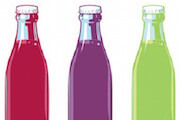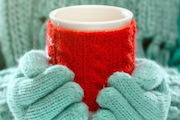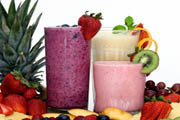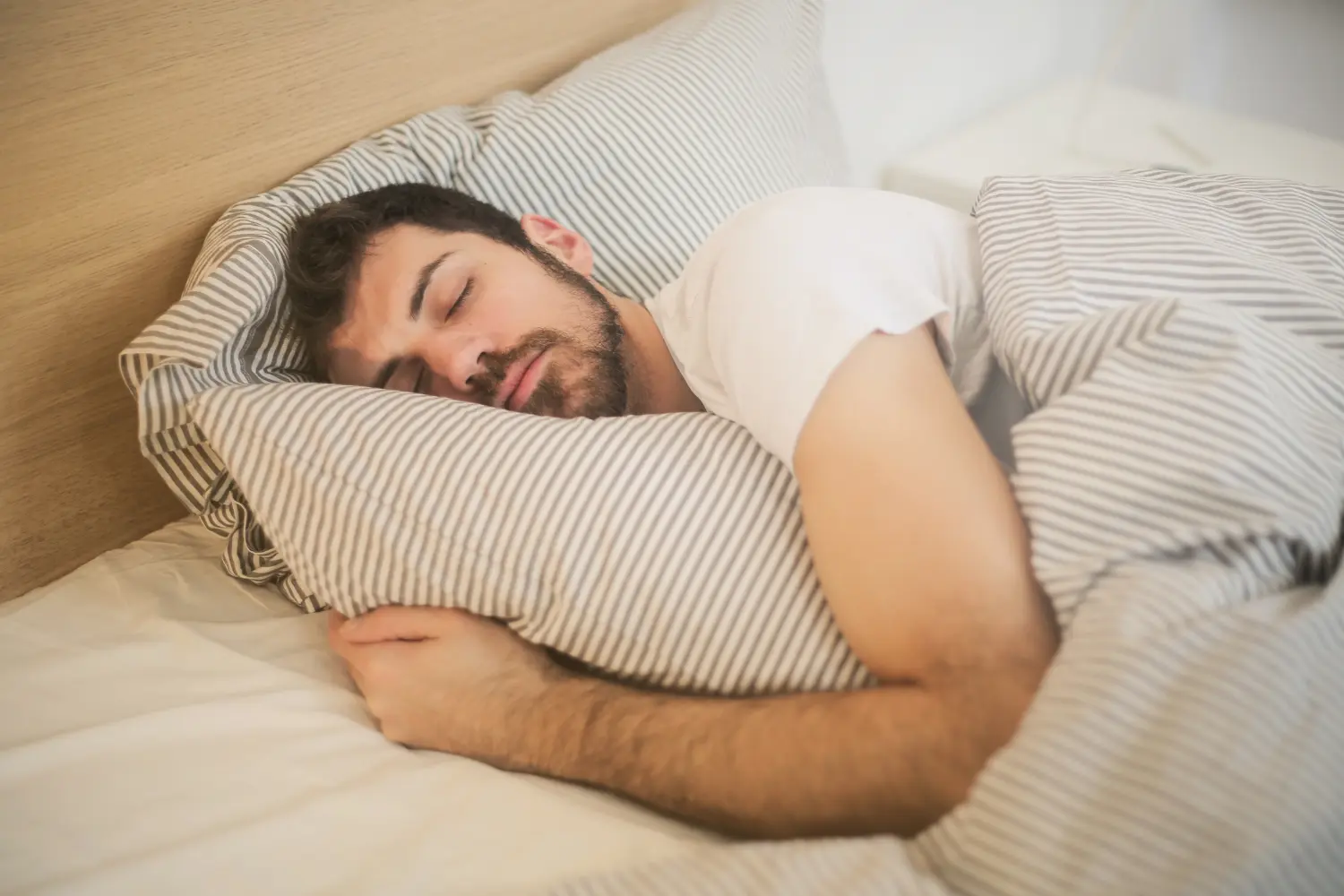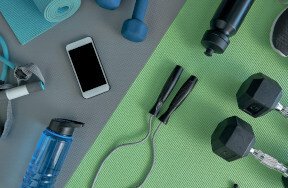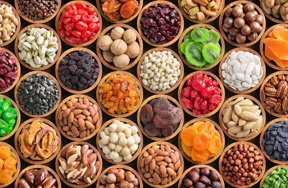What’s your favorite thing to drink? Pick up a bottle of it and look at the nutrition label. Do you recognize the ingredients? Can you pronounce them? Why should you care as long as it tastes good? If you love sweet teas, bubbly sodas, energy drinks, or even diet drinks, listen up!
Liquid Sugar: Too Much of a Sweet Thing
When you go to a restaurant, you’ll see sugar packets on the table. A normal-size bottle of soda has 22 of these sugar packets in it. It also has 256 calories and gives your body no nutrition. Bottled teas, energy drinks, powdered drink mixes, vitamin waters, flavored coffee drinks and lemonade contain almost as many of these sugar packets. When you drink these, you’re drinking liquid sugar. Why is drinking liquid sugar bad for our bodies?
- Liquid sugar may give you a sugar rush, or a short burst of energy, but it leads to a tired feeling and won’t make you feel full. It can make you eat more than usual, which leads to weight gain.
- Obesity caused by drinking too much liquid sugar leads to a higher chance of getting diseases like diabetes, heart disease, metabolic syndrome and cancer.
- Liquid sugar turns to fat in the liver, which can cause fatty liver disease.
- Liquid sugar makes your bones weaker, increasing the chance of broken bones and osteoporosis.
- Liquid sugar and acid in both sugary drinks and diet drinks spell disaster for your teeth—Tooth decay and loss of your teeth’s enamel.
- Liquid sugar affects how your brain’s reward system works, which could cause you to become addicted to sugar.
 Learn why liquid sugar is bad for your health
Learn why liquid sugar is bad for your health
Soda vs. Diet Soda
Both sodas and diet sodas have caffeine, colorings, preservatives and additives in them. While these may seem harmless, your body performs best when you steer away from artificial substances. Mold inhibitors are found in some diet drinks and there's a flame retardant in Mountain Dew. Sound tasty?
Just because there’s no sugar in diet soda doesn’t mean the fake sugar they put in it is better. It has been linked to many of the same diseases as regular soda and can cause headaches and overeating.
 How does your favorite drink stack up?
How does your favorite drink stack up?
Sports Drinks and Energy Drinks
You need energy, and these drinks are a quick way to get it, right? That quick energy comes from high amounts of sugar and caffeine, and when it wears off, you’ll feel even more tired. Coffee and energy drinks have the most caffeine by far compared to other drinks. Too much caffeine can cause restlessness, irritability, fast heartbeat, muscle tremors, upset stomach, headaches, problems sleeping and other health issues. Be aware of the amount of caffeine you’re drinking. It doesn’t take much caffeine for someone your age to feel these side effects, or to become addicted to it. To get the right kind of energy, try eating well and getting at least 8 or 9 hours of sleep. You’ll be amazed at the difference!
Sports drinks are designed to help athletes replace the energy lost during a long workout. Drink them if you’re physically active for longer than an hour. Otherwise, you’re just drinking liquid sugar.
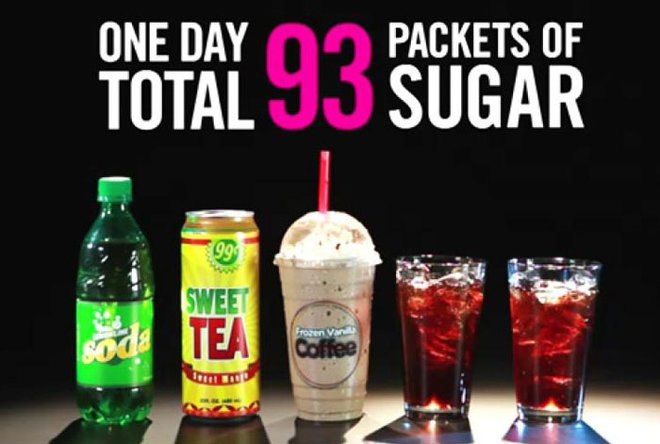 How many packets of sugar do you drink a day?
How many packets of sugar do you drink a day?
What about juice?
A small glass of real juice is fine sometimes. The sugar in 100% juice comes from natural, vitamin-filled fruit, not added sugar and empty calories. Make sure your juice is 100% fruit, and don’t supersize your glass. Better yet, just eat a piece of fruit to also get the fiber you need and help you feel full.
Read, read, read.
Labels, that is. That big can of green tea says on the front that it’s made with ginseng and honey—that sounds healthy, right? The nutrition facts label on the back lists 16 grams of sugar and 60 calories per serving. Not so bad, you think, and a great buy at 99 cents. You buy the tea and drink the whole can. But there are three servings in that can, so you just drank 48 grams of sugar and 180 empty calories. That’s how beverage companies fool you. Don’t let them—read drink labels closely and pay attention to serving size before you buy.
 Look at the servings, sugars and ingredients on drink labels.
Look at the servings, sugars and ingredients on drink labels.
What’s the best drink?
You probably already guessed that it’s good old-fashioned water. It quenches our thirst and hydrates our bodies better than any of the others—With zero sugar or chemicals. Add a bit of kick to your water bottle with lemon or orange wedges. Other low sugar options include seltzer water with fruit, milk, and unsweetened tea.
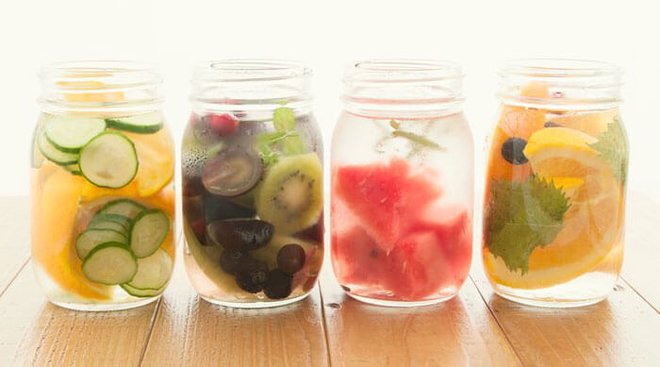 Add fruit to water to make it more flavorfulCourtesy of Getty Images
Add fruit to water to make it more flavorfulCourtesy of Getty Images
Does this mean you should never treat yourself to your favorite drink again? No. But to treat it as just that—an occasional treat. Substituting sugary drinks with your water bottle is one of the simplest ways to look and feel better. You’d be surprised how big a difference it can make. Try it for a week! Once you get used to drinking less sugar, you may even decide to make it a habit.
Tell Us What You Think
What is your favorite healthy energy drink alternative? Do you drink soda? Comment below~




























